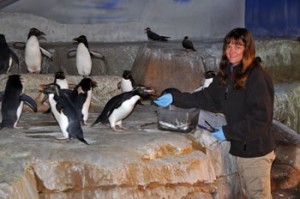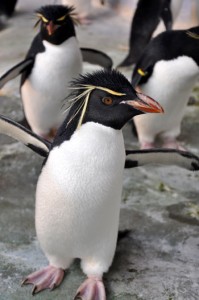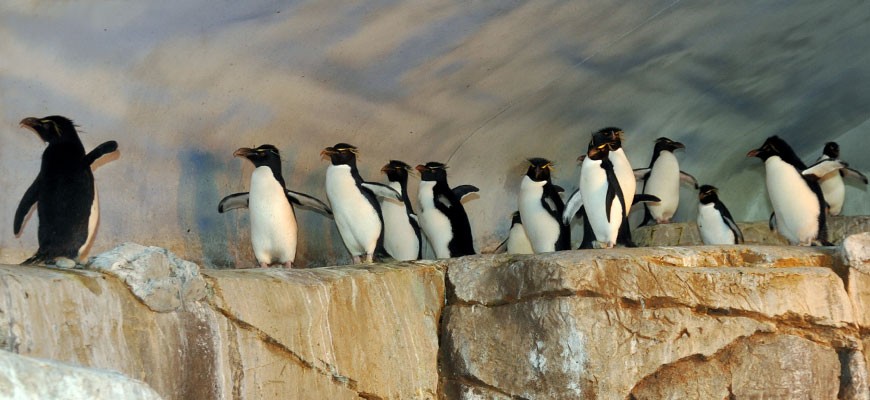 Article and Photography by Heather Dishon
Article and Photography by Heather Dishon
When most people hear the word “island,” they think of a tropical paradise with palm trees and sandy beaches. However, travel past the shady walks of our bamboo garden and through the soothing balm of our award-winning Islands Exhibit and you’ll find a much frostier part of the Islands — Penguin Coast — a wintry paradise for the Louisville Zoo’s 17 rockhopper penguins. These penguins hail from a different sort of island: the chilly and mountainous Falkland Islands located near the bottom tip of South America.
Dana Prior is the primary keeper of the Louisville Zoo’s penguins. Though she’s been in the position since 2003, her career with the Zoo began in 1998. Like most keepers, a love for animals blossomed into a career path. “I have always, always loved animals,” she says. “How many people in the world get to be penguin keepers?”
Her penguin charges range from 30 years of age (Pinky and Audrey) to only 4 years old (Clementine, hatched right here at the Zoo). Listed as one of the smallest penguin species, averaging about 20 inches in height, rockhoppers can be identified from other penguin species by their red eyes, pink feet and the spiky yellow feathers that adorn their heads.
“Each and every one is an individual, from the proper elderly lady to the troublesome teen,” Prior says. “It’s a different soap opera every day. You see pair-bonding interactions and then aggressive “he stepped too close to me” pokes. They love to collect, whether it’s new rocks for nests or stealing lettuce out of the duck’s diet, and they like to take showers from the hose while we clean. Sometimes they do what’s called an “ecstatic display” but we call it the happy dance. It always makes me smile. My most memorable moment was seeing a penguin chase her own tail and catch it.”
It’s not all fun and games however. Caring for this bustling penguin colony makes for a full day of many tasks: thawing fish and adding vitamins, ensuring each individual penguin receives its “vitamin fish,” two feedings daily, monitoring the number of fish each bird consumes, observing individuals for health issues, detecting social issues, and lots and lots of cleaning. “My, they are messy, messy birds!” Prior says.
“We hand feed our penguins which is a time investment for such a busy department but worth every minute. I can observe so much in that time.” It’s a labor of love for the longtime zoo keeper who doesn’t seem to mind the hard work. “Building relationships and trust with my animals is what I enjoy most,” she says earnestly. “I show up every day for them.”
The Louisville Zoo colony is one of only five colonies of rockhopper penguins that remain in American zoos today. Rockhopper penguin numbers are in rapid decline. The IUCN has placed them on the Red List of Threatened Species as “vulnerable” due to the loss of 30 percent of their population over the past 30 years. The Falkland Island colonies in particular have lost 90 percent of their numbers due to commercial fishing, pollution and other factors.
 “There’s been a call for more marine-protected areas to keep habitats from being degraded and to properly manage marine resources,” Prior says. Even at the Louisville Zoo, upon entering the Penguin Coast, you can see a sign supporting Monterey Bay Aquarium Seafood Watch — a program that encourages people to consume fish only from sources that rely on responsible fishing practices. “Penguins need fish available in the areas where they nest,” Prior says. “They have to find fish and get back to feed their chick in a limited amount of time. They won’t be successful in raising their offspring if they have to swim too far out for food. It is a good idea to look for the Seafood Watch cards to individually support responsible fishing as a consumer.”
“There’s been a call for more marine-protected areas to keep habitats from being degraded and to properly manage marine resources,” Prior says. Even at the Louisville Zoo, upon entering the Penguin Coast, you can see a sign supporting Monterey Bay Aquarium Seafood Watch — a program that encourages people to consume fish only from sources that rely on responsible fishing practices. “Penguins need fish available in the areas where they nest,” Prior says. “They have to find fish and get back to feed their chick in a limited amount of time. They won’t be successful in raising their offspring if they have to swim too far out for food. It is a good idea to look for the Seafood Watch cards to individually support responsible fishing as a consumer.”
“More penguin species are listed as being in trouble than ever before,” Prior says. “If you look at the numbers it’s startling to see the decline in some species. Polar bears are the endangered cold-weather icons of the north but penguins are in just as much trouble to the south. We need to educate as many people as possible and get them to care about the status of these penguins.”
Prior says some of her most rewarding moments are seeing people respond proactively to her keeper presentations — and knowing she was able to pass on her knowledge and passion about penguins. You can learn how to help penguins too! Be sure to visit the rockhopper penguins and learn about penguin conservation on your next visit to the Louisville Zoo.

